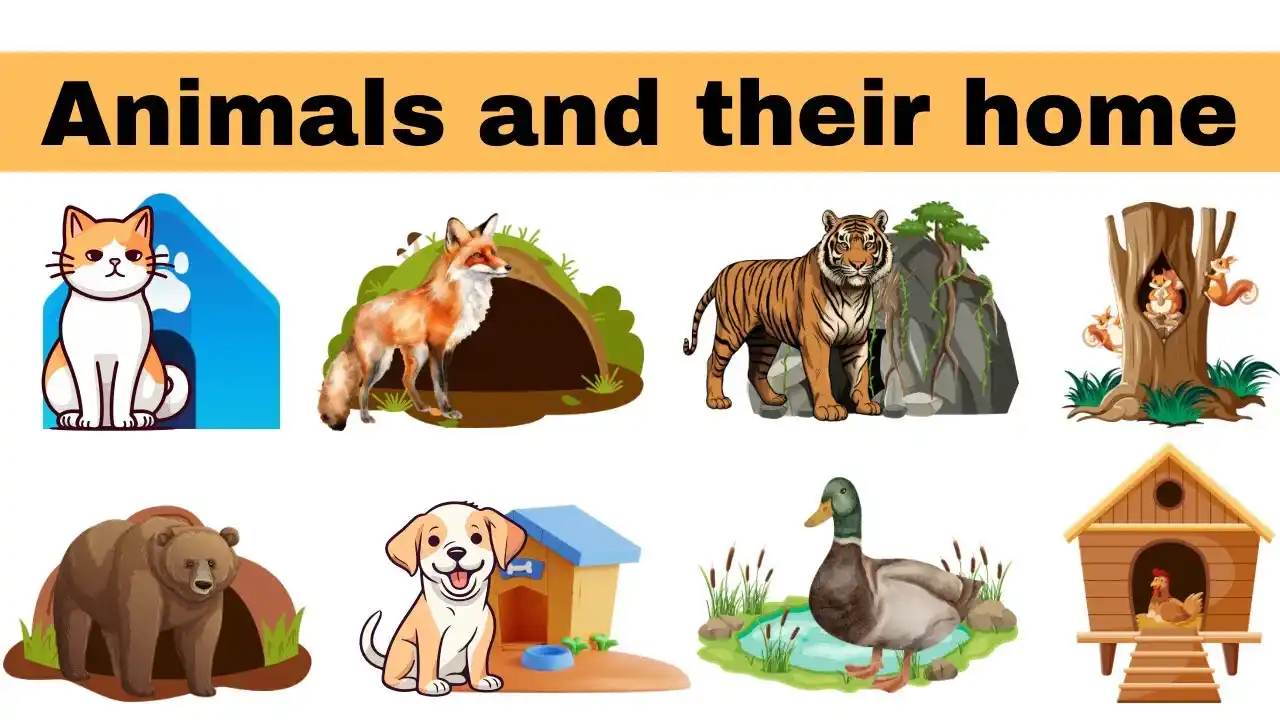Animals and Their Homes: Fun Facts for Kids
Like humans, animals need homes to stay safe, rest, and raise their young. These homes protect them from predators, harsh weather, and provide a place to sleep or store food. From dens in the wild to cozy coops and kennels, animals build or adapt shelters that suit their unique needs.
In this guide, we’ll explore 30 animals and their homes, divided into domestic and wild animals—perfect for curious young minds!
🏡 Why Do Animals Need a Home?
Animals need homes for many reasons:
- Protection from predators and harsh environments
- Safety to raise babies and lay eggs
- Comfort to rest, hide, or sleep
- Food storage for easy access to meals
Every animal’s home is shaped by its environment and survival instincts.
🐕 Domestic Animals and Their Homes
Domestic animals live with or near humans. People build homes for these animals to keep them safe, warm, and healthy.
| Animal | Home | Fun Fact |
| 1. Dog | Kennel | Dogs love cozy kennels when they’re not indoors. |
| 2. Cat | House | Cats pick soft spots around the house to nap! |
| 3. Cow | Shed | Sheds keep cows dry and provide fresh food and water. |
| 4. Horse | Stable | Stables have stalls and soft bedding for horses. |
| 5. Sheep | Pen | Pens are fenced so sheep can safely graze. |
| 6. Chicken | Coop | Chickens lay eggs and sleep in their coop. |
| 7. Rabbit | Hutch | Hutches protect rabbits from predators. |
| 8. Duck | Pond/Shelter | Ducks love water but need dry shelters too. |
| 9. Goat | Barn/Shed | Goats enjoy climbing and resting in safe barns. |
| 10. Buffalo | Shed | Like cows, buffalo need protection from weather. |
| 11. Fish | Aquarium/Pond | Aquariums mimic their natural water world. |
| 12. Bee | Hive | Bees make honey in structured hives. |
| 13. Parrot | Cage | Parrots need spacious cages with perches. |
| 14. Camel | Enclosure | Camels need shade in hot desert areas. |
| 15. Pig | Sty | Pigs stay cool and comfy in their sties. |
🐾 Wild Animals and Their Homes
Wild animals live in forests, deserts, oceans, and mountains. Their homes are crafted by nature or built using materials around them.
| Animal | Home | Fun Fact |
| 16. Polar Bear | Ice Den | Ice dens keep polar bears warm in the Arctic. |
| 17. Lion | Den | Dens give lions shelter after hunting. |
| 18. Tiger | Cave | Tigers hide in caves or dense forests. |
| 19. Elephant | Forest | Elephants rest under big trees in jungles. |
| 20. Bear | Den/Cave | Bears hibernate in dens during winter. |
| 21. Fox | Burrow | Fox burrows are cozy underground homes. |
| 22. Bird | Nest | Birds build nests to lay eggs and raise chicks. |
| 23. Snake | Hole/Burrow | Snakes hide in holes for safety and warmth. |
| 24. Monkey | Tree | Trees give monkeys food, fun, and safety. |
| 25. Deer | Forest | Deer stay hidden in tall grass and trees. |
| 26. Penguin | Ice Nest | Penguins keep eggs warm in icy nests. |
| 27. Crocodile | Riverbank | Crocodiles dig burrows near rivers. |
| 28. Spider | Web | Spiders spin webs to catch food and rest. |
| 29. Ant | Anthill | Ants build deep anthills with many tunnels. |
| 30. Frog | Pond/Swamp | Frogs need water homes to live and breed. |
🛠️ How Do Animals Build Their Homes?
Animals are excellent builders!
- Birds weave grass and twigs for nests
- Beavers build dams to create watery homes
- Spiders spin silk webs
- Ants and termites create underground tunnels
Each animal’s home fits its survival needs perfectly.
📌 Final Tip for Parents and Educators:
Use this guide as a printable animal homes chart, a classroom wall poster, or a bedtime learning story. Turn curiosity into compassion—and watch young minds bloom!
Pulses Name
Pulses are a crucial part of a balanced diet and provide essential nutrients like protein, fiber, and vitamins. Some common pulses names include chickpeas (chana), lentils (masoor), kidney beans (rajma), pigeon peas (arhar), and black gram (urad dal). These pulses are widely used in various traditional dishes across different cuisines. Pulses are not only nutritious but also environmentally friendly, as they help improve soil health by fixing nitrogen. Including a variety of pulses in your diet can help boost overall health while supporting sustainable farming practices. Incorporating different pulses names in your meals ensures diversity in nutrition.






[…] Stable Dwellings: A List of Animals and Their Homes […]
[…] Animals And Their Homes […]